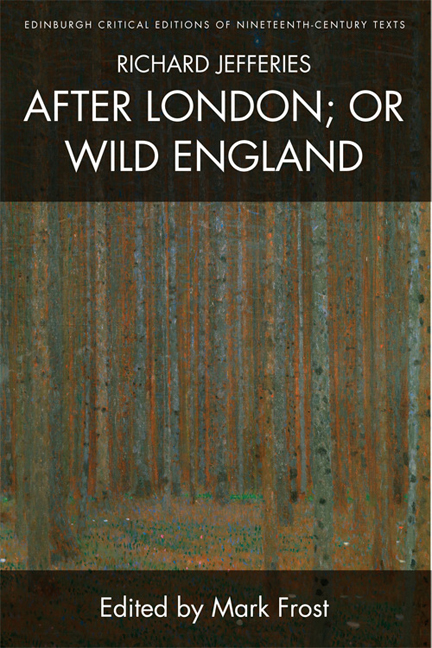Book contents
- Frontmatter
- Contents
- Introduction
- Further Reading
- A Richard Jefferies Chronology
- A Note on the Text
- After London; or Wild England
- Part I The Relapse into Barbarism
- Part II Wild England
- I Sir Felix
- II The House of Aquila
- III The Stockade
- IV The Canoe
- V Baron Aquila
- VI The Forest Track
- VII The Forest Track Continued
- VIII Thyma Castle
- IX Superstitions
- X The Feast
- XI Aurora
- XII Night in the Forest
- XIII Sailing Away
- XIV The Straits
- XV Sailing Onwards
- XVI The City
- XVII The Camp
- XVIII The King's Levy
- XIX Fighting
- XX In Danger
- XXI A Voyage
- XXII Discoveries
- XXIII Strange Things
- XXV Fiery Vapours
- XXV The Shepherds
- XXVI Bow and Arrow
- XXVII Surprised
- XXVIII For Aurora
- Appendices Supplementary writings by Richard Jefferies
XXII - Discoveries
from Part II - Wild England
Published online by Cambridge University Press: 22 December 2017
- Frontmatter
- Contents
- Introduction
- Further Reading
- A Richard Jefferies Chronology
- A Note on the Text
- After London; or Wild England
- Part I The Relapse into Barbarism
- Part II Wild England
- I Sir Felix
- II The House of Aquila
- III The Stockade
- IV The Canoe
- V Baron Aquila
- VI The Forest Track
- VII The Forest Track Continued
- VIII Thyma Castle
- IX Superstitions
- X The Feast
- XI Aurora
- XII Night in the Forest
- XIII Sailing Away
- XIV The Straits
- XV Sailing Onwards
- XVI The City
- XVII The Camp
- XVIII The King's Levy
- XIX Fighting
- XX In Danger
- XXI A Voyage
- XXII Discoveries
- XXIII Strange Things
- XXV Fiery Vapours
- XXV The Shepherds
- XXVI Bow and Arrow
- XXVII Surprised
- XXVIII For Aurora
- Appendices Supplementary writings by Richard Jefferies
Summary
THIS little circumstance of the mallards always flying over him and away behind, when flushed, presently made Felix speculate on the cause, and he kept a closer watch. He now saw (what had, indeed, been going on for some time) that there was a ceaseless stream of waterfowl, mallards, ducks, coots, moorhens, and lesser grebes coming towards him, swimming to the westward. As they met him they parted and let him through, or rose and went over. Next he noticed that the small birds on the islands were also travelling in the same direction, that is against the wind. They did not seem in any haste, but flitted from islet to islet, bush to tree, feeding and gossiping as they went; still the movement was distinct.
Finches, linnets, blackbirds, thrushes, wrens, and whitethroats, and many others, all passed him, and he could see the same thing going on to his right and left. Felix became much interested in this migration, all the more singular as it was the nesting-time, and hundreds of these birds must have left their nests with eggs or young behind them. Nothing that he could think of offered an adequate explanation. He imagined he saw shoals of fishes going the same way, but the surface of the water being ruffled, and the canoe sailing rapidly, he could not be certain. About an hour after he first observed the migration the stream of birds ceased suddenly.
There were no waterfowls in the water, and no finches in the bushes. They had evidently all passed. Those in the van of the migratory army were no doubt scattered and thinly distributed, so that he had been meeting the flocks a long while before he suspected it. The nearer he approached their centre the thicker they became, and on getting through that he found a solitude. The weeds were thicker than ever, so that he had constantly to edge away from where he supposed the main-land to lie. But there were no waterfowls and no birds on the islets. Suddenly as he rounded a large island he saw what for the moment he imagined to be a line of white surf, but the next instant he recognised a solid mass, as it were, of swallows and martins flying just over the sur-face of the water straight towards him.
- Type
- Chapter
- Information
- Richard Jefferies, After London; or Wild England , pp. 158 - 162Publisher: Edinburgh University PressPrint publication year: 2017



